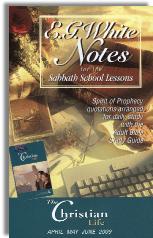|
||||||||||
Commentary on "Sin"
Day 2: Sunday, May 3, 2009
Note: Although this day's lesson is short, this commentary will be slightly lengthier so as to identify some of the major issues that will be brought into focus throughout the week. This will provide the foundation for the remaining studies this week.
What is sin?
Today’s lesson is titled, "Sin Is Rebellion." What or Who is this rebellion against? Everyone would agree that this rebellion is against the Almighty God. The Quarterly identifies passages that have been used by the Seventh-day Adventist Church to define the essence of sin. First John 3:4 says, “Everyone who sins breaks the law; in fact, sin is lawlessness.” (NIV) Sin is lawlessness. This lawlessness is not necessarily just the breaking of the commandments of the Old Testament. To identify lawlessness with the breaking of the Ten Commandments is a narrowing of the requirements laid down by Jesus Christ Himself.
The lesson states:
God has done for us all that infinite love could. In return He asks of us love and obedience. In a time in which the world is plagued by rampant lawlessness and a relativistic philosophy—which claims that good and evil depend simply on cultural circumstances and communal and personal preferences—there must and will be a people who will staunchly defend God’s standard of holiness, the Ten Commandments.
All of the law and prophets of the Old Testament, up to and including John the Baptist, were in place to prepare the way for Jesus. In Matthew 11:13, Jesus says, “For all the Prophets and the Law prophesied until John.” Once Jesus came, that which the Law and Prophets pointed forward to had come.
The Pharisees were guilty of continuing to point to the Law and Prophets at the expense of seeing that what they pointed forward to had come. Jesus said in John 5:39-40, “You diligently study the Scriptures because you think that by them you possess eternal life. These are the Scriptures that testify about me, yet you refuse to come to me to have life.”
Our Lord clarifies, through the Apostle Paul, how one is declared righteous. In Romans 3:20-22:
20 Therefore no one will be declared righteous in his sight by observing the law; rather, through the law we become conscious of sin. 21 But now a righteousness from God, apart from law, has been made known, to which the Law and the Prophets testify. 22 This righteousness from God comes through faith in Jesus Christ to all who believe. There is no difference (NIV)
John 16:8-9 defines sin for us. Jesus is telling His followers about the work of the Holy Spirit when He comes into the world. In verse 9 Jesus tells us what the Holy Spirit will identify in one's life as sin.
8 When he comes, he will convict the world of guilt in regard to sin and righteousness and judgment: 9 in regard to sin, because men do not believe in me; (NIV)
Jesus' definition of sin is when men do not believe in Him.
What is righteousness?
To identify specific sins in ones life and to be held accountable for those sins is an activity of the members of the Body of Christ. This is good. To identify those sins as the breaking of the Ten Commandments is to miss what the Ten Commandments, even the entire Law, were to point to – Jesus Christ. He is the standard. His standard is not the Ten Commandments, it is Himself. The Pharisees were experts in the Law, and while keeping the law perfectly, they were engaged in sin because they refused to come to the One to whom the Law and Prophets pointed.
Righteousness will not be, as is stated in the quarterly, by “a people who will staunchly defend God’s standard of holiness, the Ten Commandments. ” Read Romans 3:4-11:
4Let God be true, and every man a liar. As it is written: “So that you may be proved right when you speak and prevail when you judge. 5 But if our unrighteousness brings out God's righteousness more clearly, what shall we say? That God is unjust in bringing his wrath on us? (I am using a human argument.) 6 Certainly not! If that were so, how could God judge the world? 7 Someone might argue, “If my falsehood enhances God's truthfulness and so increases his glory, why am I still condemned as a sinner?” 8 Why not say—as we are being slanderously reported as saying and as some claim that we say—“Let us do evil that good may result”? Their condemnation is deserved. 9 What shall we conclude then? Are we any better? Not at all! We have already made the charge that Jews and Gentiles alike are all under sin. 10 As it is written: “There is no one righteousness, not even one; 11 there is no one who understands, no one who seeks God.”
And then in verses 19-22:
19 Now we know that whatever the law says, it says to those who are under the law, so that every mouth may be silenced and the whole world held accountable to God. 20 Therefore no one will be declared righteous in his sight by observing the law; rather, through the law we become conscious of sin. 21 But now a righteousness from God, apart from law, has been made known, to which the Law and the Prophets testify. 22 This righteousness from God comes through faith in Jesus Christ to all who believe. There is no difference (NIV)
Righteousness is given to all who believe in Jesus Christ. It is not according to the law, not even the Ten Commandments.
It is clear from this passage that the idea of a people who “staunchly” defend the Ten Commandments as God's standard of holiness is not scriptural. Christians are under the authority of Jesus Christ and taught moment by moment by the Holy Spirit. To revert to the letter of the law is to revert to a “ministry of death” (2 Corinthians 3:7) rather than to come to Him who is The Life.
God is not actively demonstrating His justice by producing a people who will end the “great controversy” by keeping the Ten Commandments perfectly. In Romans 3:19 it is clear that “every mouth may be silenced and the whole world [be] held accountable to God.” There will be no demonstration of God's righteousness apart from that which has already been demonstrated in Jesus Christ 2000 years ago. All righteousness before the time of Christ pointed forward to Him. All righteousness after the cross has always pointed back to Him. The ability to overcome the sin in the life of the believer is rooted in the supreme act of God’s righteousness demonstrated 2000 years ago. That demonstration will not be repeated. Sin was dealt with conclusively once and for all time on the cross.
Hebrews 9:25-26 is clear about this.
25 Nor did he enter heaven to offer himself again and again, the way the high priest enters the Most Holy Place every year with blood that is not his own. 26 Then Christ would have had to suffer many times since the creation of the world. But now he has appeared once for all at the end of the ages to do away with the sin by the sacrifice of himself. (NIV)
In question 2 of today's lesson is, perhaps the most quoted passage by the SDA Church, Revelation 14:12. To identify the “commandments” in this passage as being the Ten Commandments is to ignore the prevailing message of the New Testament as to the finality of God's righteousness in the person of Jesus Christ. Reading the word “commandments” as the “Ten Commandments” or even the Old Testament law is to ignore the fact that the Holy Spirit has been given to every believer. The righteousness of Christ is imputed to every believer, just as our sin was imputed to Him on the cross. As we live, the Holy Spirit continually brings before us our sins with the only way of escape ever provided by our righteous Lord: as we confess our sins, the blood of Jesus keeps on cleansing us from all sin unrighteousness (1 John 1:9.)
Sin is disbelief in Jesus. Righteousness is only given as a gift by Jesus, it is not something we do, nor a standard we live up to.
Summary
- Sin is lawlessness, but that lawlessness is not the mutilation of the Ten Commandments—it is the refusal to believe in Jesus (John 16:9.)
- Righteousness is not defined by the Ten Commandments.
- There will not be a people who will staunchly defend the Ten Commandments at the end of time, constituting the people of God.
- Our unrighteousness brings out God's righteousness more clearly. (This does not mean that we should sin so that grace would abound more.)
- The righteousness offered to us is only in the person of Jesus, through the agency of the Holy Spirit, not through our living up to a moral code.
Copyright 2008 BibleStudiesForAdventists.com. All rights reserved. Revised May 1, 2009. This website is published by Life Assurance Ministries, Glendale, Arizona, USA, the publisher of Proclamation! Magazine. Contact email: BibleStudiesForAdventists@gmail.com.
The Sabbath School Bible Study Guide and the corresponding E.G. White Notes are published by Pacific Press Publishing Association, which is owned and operated by the Seventh-day Adventist church. The current quarter's editions are pictured above.
Official Adventist Resources
Standard Edition Study Guide Week 6
Teacher's Edition Study Guide Week 6
Easy Reading Edition Study Guide Week 6
Search the Complete Published Ellen G. White Writings


